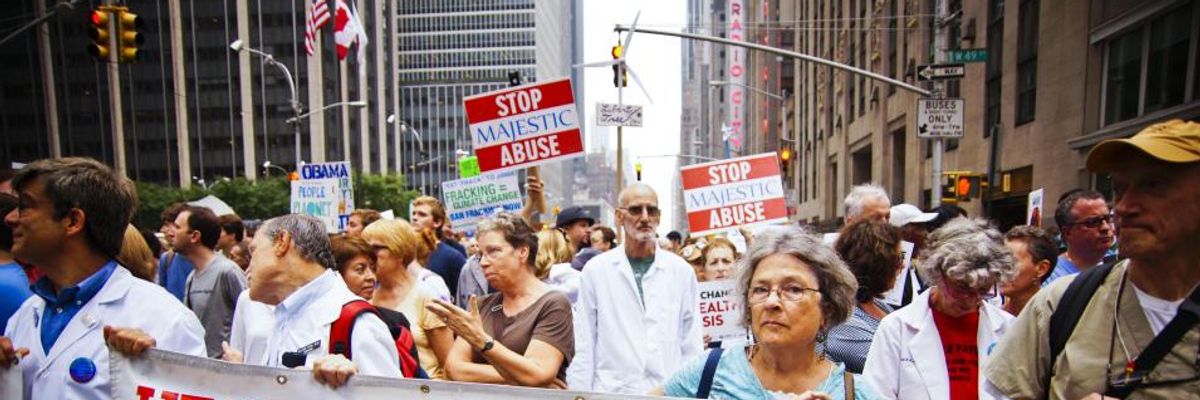The Medicare for All Act of 2019 "sets a new standard for universally and equitably guaranteeing healthcare as a human right in the United States."
That's according to a new comprehensive assessment (pdf) of the legislation released Wednesday by the National Economic & Social Rights Initiative (NESRI), a movement that focuses on rights related to health, housing, education, and work with dignity.
After analyzing the bill, which was introduced by Rep. Pramila Jayapal (D-Wash.) on Wednesday amid a groundswell of public support and grassroots organizing, NESRI concluded the plan "is by far the strongest healthcare proposal being considered by Congress."
Specifically, based on five broad criteria--universality, equity, accountability, transparency, and participation--the group found that:
If implemented as written and financed progressively, it would guarantee healthcare as a public good freely available to all, provide financial security, improve national health outcomes, and limit the continued growth in the nation's healthcare costs. It would close coverage gaps between insurance programs, abolish coverage limitations, narrow networks, and cost barriers, and eliminate inequitable tiers of coverage that allocate different levels of healthcare access not on the basis of medical need, but on discriminatory non-medical factors such as income, wealth, employment, age, and immigration status. It would shift healthcare decision-making from private healthcare companies to doctors and public, democratic processes. And by including the entire population in a unified program, it would protect public health insurance programs against future political attacks commonly waged against non-universal means-tested social insurance programs.
NESRI also broke down its review of the bill in a two-page summary (pdf). While the plan garnered high marks overall and across all five categories, the assessment pointed to some areas where there is room for improvement, including equitable financing and relief for those burdened by debt, cooperation with other social service systems, information and data rules, availability of healthcare providers, and community participation in the crafting of the legislation.
In spite of those critiques, the assessment makes clear that Jayapal's proposal lives up to the demands behind the public push for Medicare for All, unlike some of the diluted half-measures--often denounced as "Medicare for Some"--being tossed around by skeptics of scrapping private insurance and implementing a universal program.
Only a truly universal system will adequately address the problems created by private health insurance, NESRI campaign manager and assessment lead author Ben Palmquist said in a statement. As he explained:
Tens of millions of people who have insurance don't have critical coverage like dental and long-term care. Tens of millions of people are being hit with impossible medical bills, pushed into debt, or forced into choices between paying for medicine or paying for food, rent, and heating. Tens of millions of people are having to pay growing premiums, deductibles, and other costs that they simply can't afford. We need to be really clear about all the many ways in which the insurance system is failing people. A public option isn't going to fix all that.
Some observers noted on Wednesday that Jayapal's Medicare for All plan has benefits that are even more generous than a similar bill previously introduced by Sen. Bernie Sander (I-Vt.), a longtime advocate of overhauling the nation's current for-profit system to ensure comprehensive healthcare for all Americans.
In a tweet on Wednesday, Sanders, who recently announced his second run for the White House, thanked Jayapal for her proposal and reiterated that "while health insurance and drug companies make billions in profits, thousands of Americans die each year because they lack access to healthcare."

